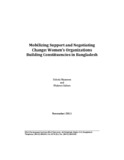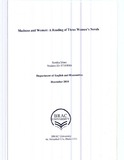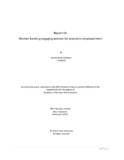Mobilizing support and negotiating change: women's organizations building constituencies in Bangladesh
Abstract
This paper describes and analyzes how three national level women’s
organizations in Bangladesh mobilized support around a particular issue among
their membership and allies. The paper uses social movement/resource
mobilization theories and feminist studies on the state and social movement for
grounding this research. The focus is on the decade of the 1990s and the present
decade. Through these case studies the research aims to capture the diversity of
the strategies used by these organizations for building constituencies‐‐internally
and externally, i.e., within the civil society organizations, media, political parties
and state bureaucracies.
All three case study organizations, have strategically packaged the issues
differently for their own members and external supporters depending on the
emotional response they want to invoke and the social costs involved in
packaging an issue in a specific way. The strategies these organizations used to
build support within the state, political parties and the civil society are influenced
by the following factors: i) the contradictory positions of the Bangladeshi state on
gender equity issues; ii) aid dependence and politicization of the civil
bureaucracy. These factors have led feminist organizations to engage with the
state in a strategic manner i.e. seizing opportunities, as and when they arise, to
further their cause. This type of behavior is motivated by the need to preserve
autonomy, organizational legitimacy, and on the use of personal connections to
access state machinery. Generally, women’s organizations have tried to distance
themselves from the political parties and have not directly lobbied for their issues
to be incorporated into the agendas. This is due to the fact that the costs of
engaging with political parties remain high and these organizations have not
established themselves as major players in the political system. The nature of
exchange with the civil society is marked by considerations for mutual reciprocity
based on personal obligations, legitimacy concerns, and asymmetrical power
relations, which at times have adversely affected accountability relations within
coalitions.
Keywords
Bangladesh; Women's Movement; CEDAW ratification; Acid violence; Women's political participation; Naripokkho; Women for Women; Bangladesh Mahila ParishadDepartment
BRAC Development Institute (BDI), BRAC UniversityType
Working paperCollections
Related items
Showing items related by title, author, creator and subject.
-
Madness and Women: A reading of three women's novels
Islam, Sonika (BRAC University, 2010-12)The state of madness is often associated with women. This paper will try to reveal the situations which drive a woman into mental imbalance. Three phases of female life are explored here- adolescence, youth and middle-age ... -
Marginalization of women in south asia: women novelists’ perspective
Bari, Morsheda (BRAC University, 2014-08)This thesis looks into the position of women in three significant novels written in English by South Asian authors, Arundhati Roy’s The God of Small Things, Anita Desai’s Clear Light of Day and Bapsi Sidhwa’s Ice Candy ... -
Women Banking engaging women for economic empowerment
Binte Saleheen, Nuzhat (Brac University, 2022-02)This report is based on the experience I had from my internship program in City Bank Limited. The report explores the knowledge I got from my internship experience. I have tried to implement the knowledge I got from ...




